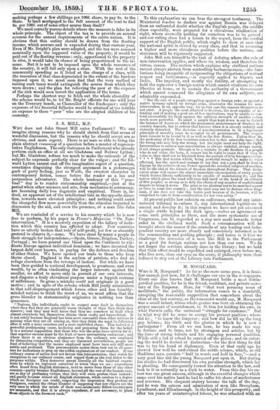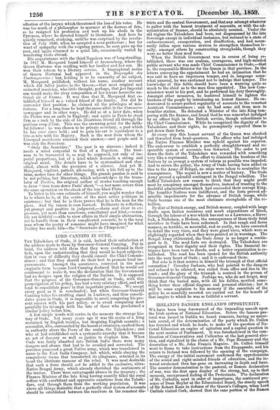M. MOCQUARD.
Wno is M. Mocquard? As far as the mere name goes, it is fami- liar enough just now, for it challenges our eye in the newspapers. Every one also knows that M. Mocquard holds a most distin- guished position, for he is the friend, confidant, and private secre- tary of the Emperor. Here, for "that vast perusing noun of multitude," the public, the information comes to a standstill, excepting the reasonable supposition that somewhere about the close of the last century, as the romancist would say, M. Mocquard was a small infant, whose whole genius was bent on obtaining the proper amount of nourishment, to fit him for holding his own, in what Darwin calls, the universal "struggle for existence." But in wliat way did he come to occupy his present position ; where did he „. 'to know the Emperor ; and how did he fill up the long gap betwee.. his birth and the glories in which he is now a participator ? From all we can hear, he has made his way to fortune and to fame, not by stratagem and artifice, but by the force of strong talents and his engaging personal qualities. While still a lad at school he carried oft the prizes ; and on enter- ing the world he dashed at distinction—for the first thing he did was to try his hand at diplomacy. Even at that early age he showed how well he understood the subtle science, which, as old Hudibras says, consists "half in words and half in face,"—and a very good face did the young Mocquard put upon it. But during his studies he had discovered his own peculiar strength which lay in pleading. He consequently turned his attention to the law, and took to it as naturally as a duck to water. From this day his ca- reer was one great success, although in the eventful changes which came over his native land he had to suffer his share of misfortunes and reverses. His eloquent oratory became the talk of the day, and he won the esteem and admiration of men like Brougham, Lyndhurst, and Ellenborongh. In the height of this prosperity, and after ten years of uninterrupted labour, he was attacked with an affection of the larynx which threatened the loss of his voice. He was too much of a philosopher to murmur at the decrees of fate, so he resigned his profession and took up his abode in the Pyrenees, where he devoted himself to literature. And here he quietly remained, studying, until he was surprised by the revolu- tion of July 1830, when he accepted a sons-prefecture; but for want of sympathy with the reigning powers, he soon gave up the post, and again returned to a quiet life, occasionally varied by wandering visits abroad.
His acquaintance with the third Napoleon was of long standing. In 1817 M. Mocquard found himself at Arenemberg, where the Queen Hortense was residing with her brother and her son. He won their esteem by a literary service. A biographical notice of Queen Hortense had appeared in the Biographic des Contemporains ; but, holding it to be unworthy of its subject, N. Mocquard published, without his name, another account which did fuller justice to the Queen,—that most original and animated musician, who little thought, perhaps, that ber Imperial son would make the stray composition of her leisure hoursthe na- tional air of France. It was thus that M. Mocquard first es- tablished himself as a valued friend of the family. Nor did he surrender that position : he claimed all the privileges of mis- fortune. For a long time he kept the cause alive in the Commerce newspaper and in other wars. He did so at a later date, when the Prince was an exile in England ; and again in Paris he stood firm as a rock by the side of his illustrious friend all through the perilous coup d'etat. This was the crowning point for the faith- ful follower : he was chosen to be private secretary, a post which he has ever since held ; and to gain his ear is equivalent to a tete-a-tete with his Majesty. Such is the man from whom the Liverpool merchants received their answer,—and people said it was only the Secretary.
" Only the Secretary." The post is no sinecure ; indeed it needs a mind congenial to that of a Napoleon. The busi- ness to be transacted is, as may be supposed, not only of im- perial proportions, but of a kind which demands a strong and original mind. The details have to be systematized and clas- sified, almost with the precision of a science. And yet M. Mocquard, vigilant, patient, all-seeing, with a life full up to the brim, makes time for other things. His grande passion is said to be not politics, but literature, which acknowledges in the trans- lator of Tacitus, the original author of stories touching enough to draw "iron tears down Paris' cheek "—a test more severe than the same operation on the cheek of the less blasé Pluto. To listen to his own estimate of himself, you might wonder that he is where he is, at the centre of the most active politique in existence ; but that he is there proves that he is the man for the place. And the reason is soon learned. Deliberate in reflection, yet prompt and positive in judgment,—sharp and clear in ex- pression, yet more than courteous, conciliatory and kind,—versa- tile yet faithful ;—able to view affairs in their simple abstraction, yet to handle them in their complicated concrete, he is the very man whom the poetry of romance might have imagined for what Destiny has made him—the " Secretaire de PEmpereur."



























 Previous page
Previous page